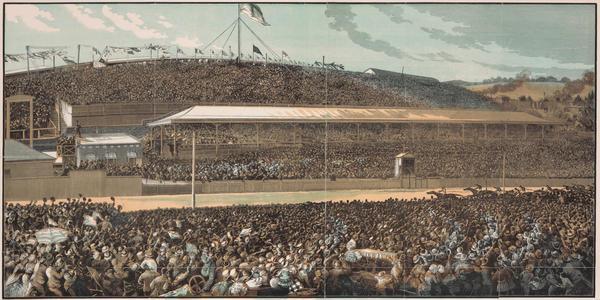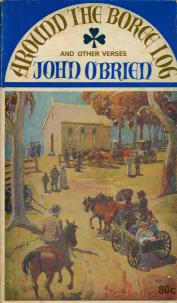My Dad would ask me when I was a kid, 'When did Good Friday fall on Easter Monday?' The answer was 'In Fairyhouse in the Irish Grand National'. Good Friday was a horse, at least according to Dad, and he didn't do too well in the big race on Easter Monday. Fairyhouse isn't too far from Dublin or from St Columban's, Dalgan Park, the Columban seminary where I lived from 1961 to 1968.
I've never been at the races in my life but I won some money on the Grand National - the one held in Aintree, near Liverpool - every April, a steeplechase. It's an occasion when almost everyone it seems in Ireland and in Britain has a 'flutter' - except those who do so regularly. It's utterly unpredictable.
In 1959, when I was turning 16, I backed Oxo, which won at 8/1 (thanks to Wikipedia for the details). The very scientific reason why I put my money on that particular horse was that we lived in the Oxmantown area of Dublin, where the Oxmen/Ostmen or 'men from the east', ie, Danes and Vikings, had settled after groups of them started to invade Ireland in 795.
Dad told me that his mother Jane did far better than I did when she backed Tipperary Tim in 1929. He came in at 100/1.
My encounters with horses have been rather sporadic. When I lived in the Columban house in Solihull, England, from 2000 to 2002 I befriended a gray stallion in the stables we rented to a neighbour who kept horses. He liked a bit of attention, not to mention sugar cubes and slices of apple.
The last time I sat on a horse was way back around this time of year in 1977 when I looked after the parish of Columban Fr Sean Nolan in Karomatan (now Sultan Naga Simaporo), Lanao del Norte for a month. One day we had to go to a very distant barrio for a fiesta Mass. We got lost as none of us in the party knew the way and forded the same river four times on the way. When we reached the village, which was way up in the mountains, we had to climb even further to the chapel.
On the way back I rode a horse, sitting behind a 14-year-old boy. Our 'saddle' was a sack. After some time I asked him, 'Asa ang karsada?' 'Where is the road?' He gave me the answer I wanted to hear, 'Duol-duol na', 'It's quite near'. When I asked him again half-an-hour late by which time I was feeling very sore, he told me the truth, 'Layo-layo pa', 'It's still quite a distance away'. At that stage, to the relief of horse and self, I got down and walked.
Finishing line, Melbourne Cup, 1881
Even though I'm from Ireland, live in the Philippines, and have no interest in racing - the last time I read the racing pages was when I was seven or eight when I'd read the names of the horses to amuse my brother Paddy, three years younger than me - it's impossible for me as a Columban not to know that each year on the first Tuesday of November the Melbourne Cup takes place. (We've had Australian Columbans since our very early days more than 90 years ago). Unlike the Grand National, it's a flat race but like the Grand National it's a race that everyone has a bet on. And it's a great festival.
Probably not too many will back Delany's Donkey this year.
'John O'Brien' was the pen-name of Monsignor Patrick Joseph Hartigan (1878 - 1952), an Irish-Australian priest who delightfully captured in verse something of the life of the Catholics in the outback of New South Wales a hundred years ago, most of whom would also have been of Irish descent. One of his most popular recitations, as we call this kind of verse in Ireland, where the works of 'John O'Brien' were well known when I was young, is Tangmalangaloo. It's story is not unrelated to the Melbourne Cup.
The bishop sat in lordly state and purple cap sublime,
And galvanized the old bush church at Confirmation time.
And all the kids were mustered up from fifty miles around,
With Sunday clothes, and staring eyes, and ignorance profound.
Now was it fate, or was it grace, whereby they yarded too
An overgrown two-storey lad from Tangmalangaloo?
A hefty son of virgin soil, where nature has her fling,
And grows the trefoil three feet high and mats it in the spring;
Where mighty hills uplift their heads to pierce the welkin's rim,
And trees sprout up a hundred feet before they shoot a limb;
There everything is big and grand, and men are giants too -
But Christian Knowledge wilts, alas, at Tangmalangaloo.
The bishop summed the youngsters up, as bishops only can;
He cast a searching glance around, then fixed upon his man.
But glum and dumb and undismayed through every bout he sat;
He seemed to think that he was there, but wasn't sure of that.
The bishop gave a scornful look, as bishops sometimes do,
And glared right through the pagan in from Tangmalangaloo.
"Come, tell me, boy," his lordship said in crushing tones severe,
"Come, tell me why is Christmas Day the greatest of the year?
"How is it that around the world we celebrate that day
"And send a name upon a card to those who're far away?
"Why is it wandering ones return with smiles and greetings, too?"
A squall of knowledge hit the lad from Tangmalangaloo.
He gave a lurch which set a-shake the vases on the shelf,
He knocked the benches all askew, up-ending of himself.
And so, how pleased his lordship was, and how he smiled to say,
"That's good, my boy. Come, tell me now; and what is Christmas Day?"
The ready answer bared a fact no bishop ever knew -
"It's the day before the races out at Tangmalangaloo.


No comments:
Post a Comment